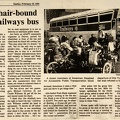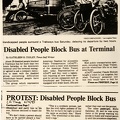[Headline] Disabled riders hopeful after meeting transport officials
San Diego Union
By Ric Bucher, Staff Writer
2/11/85
Mike Auberger and Dana Jackson were not smiling when they wheeled out of the Hilton Hotel's Capri Room, but they were hopeful.
Auberger and Jackson, along with 13 other wheelchaired members of American Disabled for Accessible Public Transportation, asked board members of the American Public Transportation Association to endorse full accessibility for the disabled to all public transit vehicles. And they aimed their plea at the board members’ hearts rather than their budget.
“I think we really shook them up,” Jackson said.
“They have come a long way,” Auberger said. “Two years ago, they didn't want us in the room. This time they asked questions.”
One of those questions, posed by John Pingree, transit manager of Salt Lake City, Utah, personalized one of APTA’s primary disagreements with the ADAPT group. The transit manager said he has an autistic child whom handicap requires the use of specially equipped vans presently available to the handicapped in most cities. The cost of fitting public transportation system with wheelchair lifts, ramps and wider doorways would take away funds currently subsidizing these van services, APTA members claim.
ADAPT members say, however, that the van service method is severely handicapped itself. Van service must be reserved 24 hours in advance for a specific time and destination, and ADAPT members say the vans segregate them from the rest of the public.
“Imagine if you had to program your car 24 hours in advance every time you wanted to go anywhere, and that was the only way you could get there,” Jackson said. Jackson is the ADAPT transportation coordinator in Washington, D.C.
Wade Blank, who helped found ADAPT 12 years ago, said the group's appeal focused on “the moral imperative” aspect of equal access, instead of “costs and everything else.” Blank, who is not disabled, feels the transit system discriminates against the disabled now as it once did against black people.
Blank believes the presentation created a rift between transit managers who have superior handicap access – Seattle was cited as the best – and those with lesser facilities. San Diego is one of the worst, according to Auberger.
APTA’s executive vice president, Jack Gilstrap, said the APTA board has appointed a committee to study the ADAPT and give a report, tomorrow. Gilstrap said the main purpose of the meeting here is to address the severe budget cuts planned for the Department of Transportation by the government.
- Created on
- Thursday 11 July 2013
- Posted on
- Thursday 10 December 2015
- Tags
- 24 hour advanced reservation, ADAPT - American Disabled for Accessible Public Transportation, APTA - American Public Transit Association, Dana Jackson, Jack Gilstrap, Mike Auberger, paratransit, San Diego, Seattle, type of trip, Utah, Wade Blank, Washington DC
- Visits
- 2213
- Rating score
- no rate
- Rate this photo


0 comments